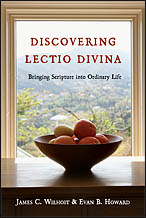
Editor’s note: In response to Bob’s review of his book Kneeling with Giants: Learning to Pray with History’s Best Teachers, Gary Neal Hansen commented that this Lent he’s trying to engage in a more serious lectio divina. For those desiring to learn more about this spiritual practice, Discovering Lectio Divina: Bringing Scripture into Ordinary Life by James C. Wilhoit[1] and Evan B. Howard[2] (InterVarsity Press, 2012) provides helpful insight.
Lectio divina is an ancient practice of reflective reading and praying about the scriptures that includes the elements of slow and repeated reading (lectio), reflection (meditatio), prayer in response to one’s reflections (oratio) and resting in God’s presence (contemplatio).
What Wilhoit and Howard give us is not a “how to” manual for lectio so much as a deeply theological and formational reflection of what it means to weave this discipline into one’s life. They begin with our thirst for God and the scriptures as God’s speech, his invitation to relationship.
They then focus on the fact that we do not come alone as we read the text but read with and in the Spirit’s presence who helps us understand. The authors walk us through their own reading experience in the story of Jesus and the paralytic in Luke 5:17-26.
Succeeding chapters focus on meditating (with a fascinating discussion of meditation being compared to a dog growling over/gnawing a bone), praying (“prayer as the house that lectio divina inhabits” is a particularly striking idea), and contemplation (they discuss how in relationships, we have our verbal conversation, our thoughts of the other as we speak, and then a more foundational level, our awareness of our presence in the presence of the other). Each flesh out the bare bones of the different elements of lectio. The concluding chapter speaks of the rhythm of life in which scripture leads into action and action leads into scripture.
Overall, I found this a very helpful book. Beyond the personal examples shared, I would have found some exercises in lectio helpful, particularly for those new to the practice. The book assumes that readers will translate concepts into practice. However, for those already acquainted with the practice, the book is quite helpful in taking one deeper into how lectio divina helps us encounter the living God.
Editor’s question for the reader: What do you think about lectio divina? Have you practiced it? Are you interested in learning more? Should we have a post focused on the practice?
Notes
- James Wilhoit is Scripture Press Professor of Christian Education at Wheaton College in Wheaton, Illinois. He is the author of Spiritual Formation as if the Church Mattered, coeditor of the Dictionary of Biblical Imagery (IVP Academic) and coauthor, with Leland Ryken, of Effective Bible Teaching. — Biography from the InterVarsity Press author page. ↩
- Evan Howard is director of the Spirituality Shoppe: An Evangelical Center for the Study of Christian Spirituality, based in Montrose, Colorado. He has served as a pastor and has taught in various colleges and seminaries. He is also the author of The Brazos Introduction to Christian Spirituality and Praying the Scriptures: A Field Guide for Your Spiritual Journey. — Biography from the InterVarsity Press author page. ↩
Bob Trube is Associate Director of Faculty Ministry and Director of the Emerging Scholars Network. He blogs on books regularly at bobonbooks.com. He resides in Columbus, Ohio, with Marilyn and enjoys reading, gardening, choral singing, and plein air painting.

Meditation is a new skill that I am trying to learn. It’s not easy but I have found a really good introduction to meditation through the book, ” Get Balanced, Get Blissed: Nourishment for Body, Mind, and Soul” http://liveblissnow.com/ by author Lynne Goldberg. I think to master meditation and scriptures together will be another goal to conquer. Thanks for the review.
I’ve been practicing meditation for over a decade, Lauren, and it has made a big difference in my life. You will experience more focus, and rest especially. All the best to you on your journey, and than you very much for your book recommend!
Lauren and Molly, thanks for the comments and glad the review was helpful. One of the things I’ve observed is that meditation can mean a variety of things from emptying our minds of thoughts and feelings to an attentiveness to God and the scriptures that fills our minds. The latter is more consistent with Christian practice through the ages. Lectio is one of those practices that reads and re-reads a short passage, perhaps a Psalm or a short narrative from the gospels, listening for what captures our attention and then waiting before God to understand what this can mean for our context. Michael Casey’s “Sacred Reading: The Ancient Art of Lectio Divina” is also helpful. Here is the Amazon link for it: http://www.amazon.com/Sacred-Reading-Ancient-Lectio-Divina/dp/0892438916/ref=cm_lmf_tit_3